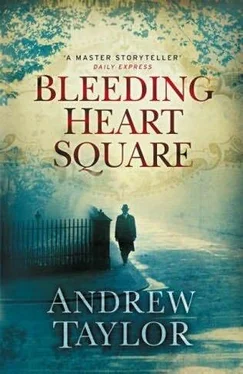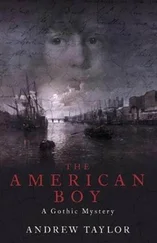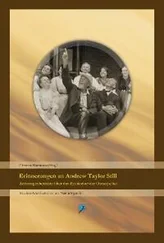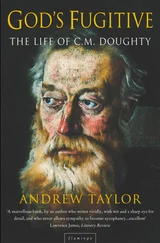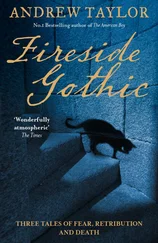Andrew Taylor - Bleeding Heart Square
Здесь есть возможность читать онлайн «Andrew Taylor - Bleeding Heart Square» весь текст электронной книги совершенно бесплатно (целиком полную версию без сокращений). В некоторых случаях можно слушать аудио, скачать через торрент в формате fb2 и присутствует краткое содержание. Жанр: Триллер, на английском языке. Описание произведения, (предисловие) а так же отзывы посетителей доступны на портале библиотеки ЛибКат.
- Название:Bleeding Heart Square
- Автор:
- Жанр:
- Год:неизвестен
- ISBN:нет данных
- Рейтинг книги:5 / 5. Голосов: 1
-
Избранное:Добавить в избранное
- Отзывы:
-
Ваша оценка:
- 100
- 1
- 2
- 3
- 4
- 5
Bleeding Heart Square: краткое содержание, описание и аннотация
Предлагаем к чтению аннотацию, описание, краткое содержание или предисловие (зависит от того, что написал сам автор книги «Bleeding Heart Square»). Если вы не нашли необходимую информацию о книге — напишите в комментариях, мы постараемся отыскать её.
Bleeding Heart Square — читать онлайн бесплатно полную книгу (весь текст) целиком
Ниже представлен текст книги, разбитый по страницам. Система сохранения места последней прочитанной страницы, позволяет с удобством читать онлайн бесплатно книгу «Bleeding Heart Square», без необходимости каждый раз заново искать на чём Вы остановились. Поставьте закладку, и сможете в любой момент перейти на страницу, на которой закончили чтение.
Интервал:
Закладка:
‘The only thing I really mind about is what happened to Gerry. I don’t mind about not having children, or not now. One gets used to it. And as for having to sell Rawling that’s neither here nor there. Owning land is an awful burden nowadays, and I never really liked the house. But Gerry’s another matter. I should be grateful that he came home in one piece when so many others didn’t, but he doesn’t deserve to be as he is. So fragile. It’s such a waste. He dreams about bombers almost every night.’
‘Over London?’
‘Yes. He came through France with hardly a scratch, though he must have seen the most ghastly things. Probably did them too. But he was there in Southampton Row, on leave, when they dropped the bomb on the Bedford Hotel. It was the big one in ’17 — a lot of people were killed, and he was one of the injured. That’s why he can’t use his arm. And now he can’t get the idea out of his head: swarms of bombers like rooks and the bombs falling like hail. Civilians dying in droves. Nowhere to hide. Nothing one can say can reason him out of it.’
‘I suppose it’s the next best thing to impossible,’ Lydia said. ‘Arguing him out of it, I mean.’
The car swerved again. Mrs Alforde said, ‘I don’t follow. Why?’
‘Because he could well be right.’
There was something about Julian Dawlish that made people want to trust him. If he had been a dog, he would have been a St Bernard patrolling the Alpine passes with a keg of brandy attached to his collar and panting to offer a warming drink to any benighted traveller he might encounter. His face and perhaps his behaviour seemed to promise an inner philanthropy. Even Mrs Renton, not the most trusting of human beings, wasn’t proof against his peculiar form of charm. That was why she let him into the house and allowed him unescorted upstairs. That was why, when Rory opened his flat door, he found Dawlish standing outside with a smile on his face and Rory’s suitcase in his hand. And that was why Rory smiled back with a pleasure that was both unforced and unexpected.
‘Hello, Wentwood. The lady who let me in said I could come up. Hope it’s not a bad time.’
‘Of course not.’ Rory opened the door more widely, aware that his unexpected visitor had a good view of the unmade bed through the open door of the bedroom; in the sitting room he would soon be passing within eighteen inches of the remains of Rory’s breakfast on the crumb- and ash-strewn table. ‘This is very kind of you.’
Dawlish put down the suitcase. ‘Phew.’
‘Everything all right?’ Rory said suddenly.
‘Absolutely. If you mean at Cornwallis Grove, that is. Though in point of fact Fenella’s not there at present. She’s in Mecklenburgh Square.’
Rory swept a pile of papers from the seat of the one comfortable armchair. ‘Do sit down.’
‘Thanks, but no. I’ve left Fenella measuring up for curtains. I was only in the way so I thought I’d run your things over. But I promised I wouldn’t be long.’
The two men went downstairs. Rory was relieved to get Dawlish out of the flat. He himself had grown accustomed to the place, after a fashion; but having Dawlish there made him see it abruptly and cruelly through Dawlish’s eyes. A squalid little place, he thought, dirty and utterly depressing. And it was costing him more than he could afford. Ahead of him his life stretched as a vista of ever more unpleasant homes.
‘You and Fenella will almost be neighbours,’ Dawlish said. ‘Which reminds me: would you like to pop over there for lunch today? Just a scratch meal, she said.’
Rory thought there was pity in Dawlish’s eyes. Damn the man. ‘Thank you,’ he said. ‘But I’m not sure I can.’
‘Shame. But if circumstances alter, do come along. It’s number fifty-three, the basement entrance. One o’clockish.’
They passed the first-floor landing. Rory half-hoped Lydia would be there. He wouldn’t have minded Dawlish meeting her — she came from the same social drawer as Dawlish, if not the one above. But she had gone out for the day, according to Mrs Renton, with a lady who had called for her in a car. Judging by the snores, Captain Ingleby-Lewis was still asleep, which was just as well. Serridge was out. That left Mrs Renton, who had returned to her sewing machine, and Malcolm Fimberry, who was unfortunately standing in the hall, pince-nez askew on his nose, his hair carefully arranged so that it looked like a heap of buttered curls, and his flies undone.
‘Hello, Wentwood. I wonder if you could lend me a pinch of tea? I’ve run out and I don’t want to ask Mrs Renton again.’
He peered at Julian Dawlish, so Rory had to introduce them. The three of them went outside. A large maroon Lagonda was standing outside the front door. Two small boys were examining it with careful nonchalance.
‘That’s a fine car,’ Fimberry said, bestowing a cautious pat on the nearside front mudguard.
‘Not mine, actually,’ Dawlish said, looking as close to embarrassed as Rory had seen him. ‘It’s my brother’s bus. Mine’s in for a service.’ He glanced around him, clearly trying to distance himself from the magnificent vehicle. ‘Interesting place — I’ve never been here before. What’s that chapel over there?’
The question loosened Fimberry’s tongue in much the same way that brandy in its early stages loosened Ingleby-Lewis’s. Soon he was describing the vanished palace of the bishops.
Dawlish plunged into the flow. ‘That chapel, Mr Fimberry — is that where they’re having the meeting on Saturday? I’ve seen a poster for it.’
‘On my window, perhaps,’ Fimberry said. ‘Yes — in the undercroft.’
‘It’s a public meeting, is it?’
‘As far as I know. They’re particularly interested in attracting the businessmen in the area. That’s why they’re having it at Saturday lunchtime. I’m sure you’d be most welcome if you wanted to come.’ He gave a high, nervous laugh like a horse’s whinny. ‘The more the merrier, that’s what the organizer said to me.’ He smiled and brought his face uncomfortably close to Dawlish’s. ‘He’s called Sir Rex Fisher. I don’t know if you know him?’
Dawlish shook his head. ‘We’ve never met. I know of him, though.’ He turned to Rory. ‘I must push off. We’ll run into each other at Cornwallis Grove, I expect. But do come to lunch if you can manage it.’
‘And of course if you come to the meeting,’ Fimberry went on, ‘you’ll be able to see round the chapel. If you’re lucky you’ll see the Ossuary as well.’
‘We brought nothing into this world,’ said Mr Gladwyn, ‘and it is certain we can carry nothing out. The Lord gave, and the Lord hath taken away; blessed be the Name of the Lord.’
It was cold in the dark little church, and Lydia’s hands burrowed deep in the pockets of her coat. She was beside Mrs Alforde in one of the pews at the front. A sparrow had found its way into the church and every now and then it launched itself into flight, fluttering in vain around the pitch-pine beams, searching for the sky.
The plain coffin was resting on trestles in the chancel. There were no flowers. Someone was crying quietly.
‘I held my tongue,’ Mr Gladwyn was saying, ‘and spake nothing: I kept silence, yea, even from good words; but it was pain and grief to me.’
In the other front pew was a tall woman in a long, dark, shabby coat, with her face hidden by a veil. There were two other women, both old, one on either side of her. The undertaker’s men and the sexton were behind them.
‘Thou turnest man to destruction: again thou sayest, Come again, ye children of men.’
Mrs Alforde stood, sat and knelt, and Lydia followed suit. There was no singing. The Vicar had pared the service down, and its brief, stark finality was terrible. When the time came, the little congregation trooped out after the coffin to the open grave at the bottom of the churchyard. They watched the undertaker’s men lowering the coffin into the raw earth. The sun came out from behind a cloud and suddenly the churchyard was bright and full of colour, inappropriately festive.
Читать дальшеИнтервал:
Закладка:
Похожие книги на «Bleeding Heart Square»
Представляем Вашему вниманию похожие книги на «Bleeding Heart Square» списком для выбора. Мы отобрали схожую по названию и смыслу литературу в надежде предоставить читателям больше вариантов отыскать новые, интересные, ещё непрочитанные произведения.
Обсуждение, отзывы о книге «Bleeding Heart Square» и просто собственные мнения читателей. Оставьте ваши комментарии, напишите, что Вы думаете о произведении, его смысле или главных героях. Укажите что конкретно понравилось, а что нет, и почему Вы так считаете.
